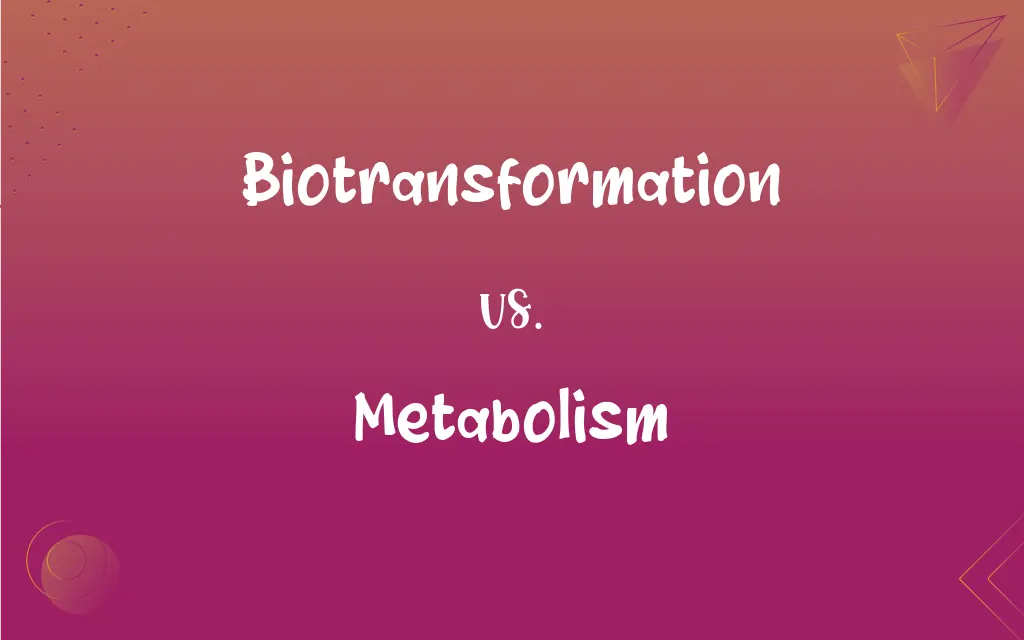Biotransformation vs. Metabolism: What's the Difference?
Edited by Aimie Carlson || By Harlon Moss || Published on February 4, 2024
Biotransformation is the chemical modification of substances by living organisms or enzymes, while metabolism is the entire set of life-sustaining chemical reactions in organisms.

Key Differences
Biotransformation refers specifically to the chemical alterations a substance undergoes within a biological system. Metabolism encompasses all chemical reactions in an organism, including those involved in energy production and utilization.
Biotransformation is a part of metabolism focused on modifying non-native substances. Metabolism, a broader term, includes catabolism (breaking down molecules for energy) and anabolism (building up molecules for cell function).
Biotransformation plays a key role in detoxifying harmful compounds. Metabolism, on the other hand, is essential for all cellular processes, including growth, reproduction, and maintaining homeostasis.
In biotransformation, substances are chemically altered to become more water-soluble. Metabolism involves numerous biochemical pathways for synthesizing and breaking down compounds necessary for life.
The end products of biotransformation are often excreted from the body. In metabolism, end products can be waste materials or molecules used in other metabolic reactions.
ADVERTISEMENT
Comparison Chart
Definition
Chemical modification of substances by organisms
Totality of an organism's chemical reactions
Primary Focus
Altering non-native substances
Energy production, utilization, and cell growth
Role in Organism
Detoxification and drug metabolism
Sustaining life processes
Types of Processes
Primarily conversion to water-soluble forms
Catabolism and anabolism
Relationship to Organism
Subset of metabolic processes
Encompasses all biochemical reactions
ADVERTISEMENT
Biotransformation and Metabolism Definitions
Biotransformation
Biotransformation is the alteration of chemicals by biological systems.
The liver's biotransformation of drugs makes them easier to excrete.
Metabolism
Metabolism includes the processes of catabolism and anabolism.
Muscle growth is an anabolic aspect of metabolism.
Biotransformation
Biotransformation involves modifying substances for detoxification.
Pesticides undergo biotransformation to reduce their toxicity.
Metabolism
Metabolism is the set of life-sustaining chemical reactions in organisms.
A fast metabolism helps some people burn calories quickly.
Biotransformation
Biotransformation can render harmful compounds harmless.
Bacterial biotransformation in the gut assists in breaking down toxins.
Metabolism
Metabolism determines the energy and material needs of cells.
Regular exercise can increase one's metabolism.
Biotransformation
Biotransformation processes vary among different organisms.
Fish have unique biotransformation pathways for environmental toxins.
Metabolism
Metabolism varies among individuals, affecting their energy levels.
Thyroid disorders can significantly alter metabolism.
Biotransformation
Biotransformation is key in pharmaceutical drug metabolism.
Biotransformation affects how long a medication remains active in the body.
Metabolism
Metabolism is crucial for growth, reproduction, and maintenance.
Metabolism slows down as people age.
Biotransformation
Chemical alteration of a substance within the body, as by the action of enzymes.
Metabolism
The chemical processes occurring within a living cell or organism that are necessary for the maintenance of life. In metabolism some substances are broken down to yield energy for vital processes while other substances, necessary for life, are synthesized.
Biotransformation
(biochemistry) The changes (both chemical and physical) that occur to a substance (especially a drug) by the actions of enzymes within an organism
FAQs
What is biotransformation?
It's the chemical alteration of substances within living organisms.
What's the main role of metabolism?
To maintain life by managing energy and material resources in cells.
Why is biotransformation important?
It helps in detoxifying and excreting harmful substances.
What is metabolism?
The entire set of chemical reactions essential for life in an organism.
How does biotransformation relate to metabolism?
It's a subset of metabolic processes, focusing on substance modification.
What factors influence biotransformation?
Genetics, age, diet, and environmental factors.
Can biotransformation create toxic compounds?
Yes, sometimes it converts substances into more harmful forms.
What's the difference between catabolism and anabolism?
Catabolism breaks down molecules for energy, anabolism builds them up.
How is metabolism measured?
Through metabolic rate, often gauged by oxygen consumption.
What role do enzymes play in biotransformation?
They catalyze the chemical reactions involved.
Can metabolism be artificially altered?
Certain medications and health conditions can change metabolic rates.
How do diseases affect metabolism?
They can disrupt normal metabolic processes, leading to various symptoms.
Is biotransformation always beneficial?
Mostly, but it can sometimes produce harmful metabolites.
How do liver diseases impact biotransformation?
They can impair the liver's ability to metabolize substances.
How does metabolism affect weight?
A faster metabolism can lead to more energy expenditure and weight loss.
Are there species differences in biotransformation?
Yes, different species have varied biotransformation capabilities.
Can lifestyle changes affect metabolism?
Yes, diet, exercise, and sleep patterns can impact metabolic rate.
What's the connection between metabolism and energy?
Metabolism governs the conversion of food to energy.
Are all drugs subject to biotransformation?
Most are, to varying degrees, depending on their chemical structure.
What's the effect of aging on metabolism?
Generally, metabolism slows down with age.
About Author
Written by
Harlon MossHarlon is a seasoned quality moderator and accomplished content writer for Difference Wiki. An alumnus of the prestigious University of California, he earned his degree in Computer Science. Leveraging his academic background, Harlon brings a meticulous and informed perspective to his work, ensuring content accuracy and excellence.
Edited by
Aimie CarlsonAimie Carlson, holding a master's degree in English literature, is a fervent English language enthusiast. She lends her writing talents to Difference Wiki, a prominent website that specializes in comparisons, offering readers insightful analyses that both captivate and inform.































































